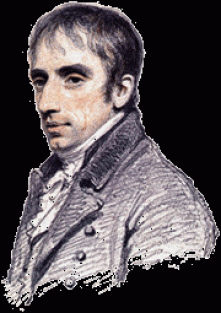Ballad Meter
a four-line stanza rhymed abcd with four feet in lines one and three and three feet in lines two and four.
O mother, mother make my bed.
O make it soft and narrow.
Since my love died for me today,
I’ll die for him tomorrow.
Lucy I
William Wordsworth
Strange fits of passion have I known:
And I will dare to tell,
But in the lover’s ear alone,
What once to me befell.
When she I loved look’d every day
Fresh as a rose in June,
I to her cottage bent my way,
Beneath an evening moon.
Upon the moon I fix’d my eye,
All over the wide lea;
With quickening pace my horse drew nigh
Those paths so dear to me.
And now we reach’d the orchard-plot;
And, as we climb’d the hill,
The sinking moon to Lucy’s cot
Came near and nearer still.
In one of those sweet dreams I slept,
Kind Nature’s gentlest boon!
And all the while my eyes I kept
On the descending moon.
My horse moved on; hoof after hoof
He raised, and never stopp’d:
When down behind the cottage roof,
At once, the bright moon dropp’d.
What fond and wayward thoughts will slide
Into a lover’s head!
‘O mercy!’ to myself I cried,
‘If Lucy should be dead!’
William Wordsworth wrote the poem “Lucy I” in ballad meter to signify the emotion he felt when he believed his beloved Lucy to be dead. He uses the moon to symbolize the anticipation he feels when he thinks about returning home to his love. The moon’s dissention parallels his thoughts of Lucy dying without him there. When the moon finally “drop[s]”, Wordsworth fears that “Lucy [could] be dead”. The use of ballad meter enhances the emotions that lovers feel towards one another, and the thoughts of losing each other.

"Wisdom is oftentimes nearer when we stoop than when we soar." ~William Wordsworth
William Wordsworth

William Wordsworth was born on 7 April 1770 in a fine Georgian house in Cockermouth, now called Wordsworth House. His father John was estate agent to Sir James Lowther, who owned the house. The garden at the back, with the River Derwent flowing past, was a place of magic and adventure for the young William. William has an elder brother Richard, a younger sister Dorothy and two younger brothers John and Christopher. His childhood was spent largely in Cockermouth and Penrith, his mother's home town. William and Dorothy and his future wife Mary Hutchinson attended infant school in Penrith between 1776 and 1777. William's mother died in Penrith when he was 8. His father died when he was 13, and is buried in the churchyard of All Saints Cockermouth. All Saints church rooms is on the site of the Cockermouth school that William attended as a boy.
From 1779 until 1787 William attended the Grammar School in Hawkshead, lodging with Ann Tyson at Colthouse initially, then with his brothers. At Hawkshead William thrived - receiving encouragement from the headmaster to read and write poetry. During these years he made many visits to the countryside, gaining inspiration as the powers of nature exercised their influence. He then went to St John's College Cambridge, where he was not a notable student, but inevitably matured in thought and sophistication. In 1795 he received a bequest of £900 which gave hive the means to pursue a literary career. In 1795 the Wordsworths stayed in a cottage in Dorset, where they met Samuel Taylor Coleridge and Robert Southey. In the years ahead a close relationship developed between William, Dorothy and Coleridge. William and Coleridge then undertook a tour of the Lake District, starting at Temple Sowerby, and finishing at Wasdale Head, via Grasmere. At Grasmere they saw Dove Cottage, then an empty Inn called the Dove and Olive Branch. In December 1799 William and Dorothy moved into Dove Cottage. Coleridge having previously moved to Greta Hall. Dorothy was William's secretary as William dictated his poetry. In 1802 William married his childhood companion Mary Hutchinson, and the first three of their five children were born. Thomas de Quincey was a permanent guest, and in 1808 as the cottage became inadequate, they moved to Allan Bank in Grasmere, a large house that William had condemned as an eyesore when it was being built. They lived here for two years, with poet and friend Coleridge. They then moved to the Old Rectory, opposite St Oswald's Church, a cold and damp house where his two youngest children died. In 1813 they moved to Rydal Mount, where William and Mary stayed until their deaths in 1850 and 1859. Whilst at Rydal Mount William became Distributor of Stamps for Westmorland, and had an office in Church St Ambleside. In 1820 he published his 'Guide through the District of the Lakes'. In 1842 he became the Poet Laureate, and resigned his office as Stamp Distributor. He helped to choose the site of St Mary's Church, built just below Rydal Mount, and where he was church warden from 1833 to 1834.
In 1850 William caught a cold on a country walk, and he died on 23 April, St George's day, 80 years after his birth. He and Mary who died 9 years later have a simple tombstone in the churchyard of St Oswald's Church in Grasmere, now one of the most visited literary shrines in the world. William Wordsworth wrote some 70000 lines of verse, 40000 lines more than any other poet. Cumbria Tourist Board publish a leaflet called 'Wordsworth's Lake District', describing the many places that Wordsworth had associations with.
(http://www.visitcumbria.com/wilword.htm)
